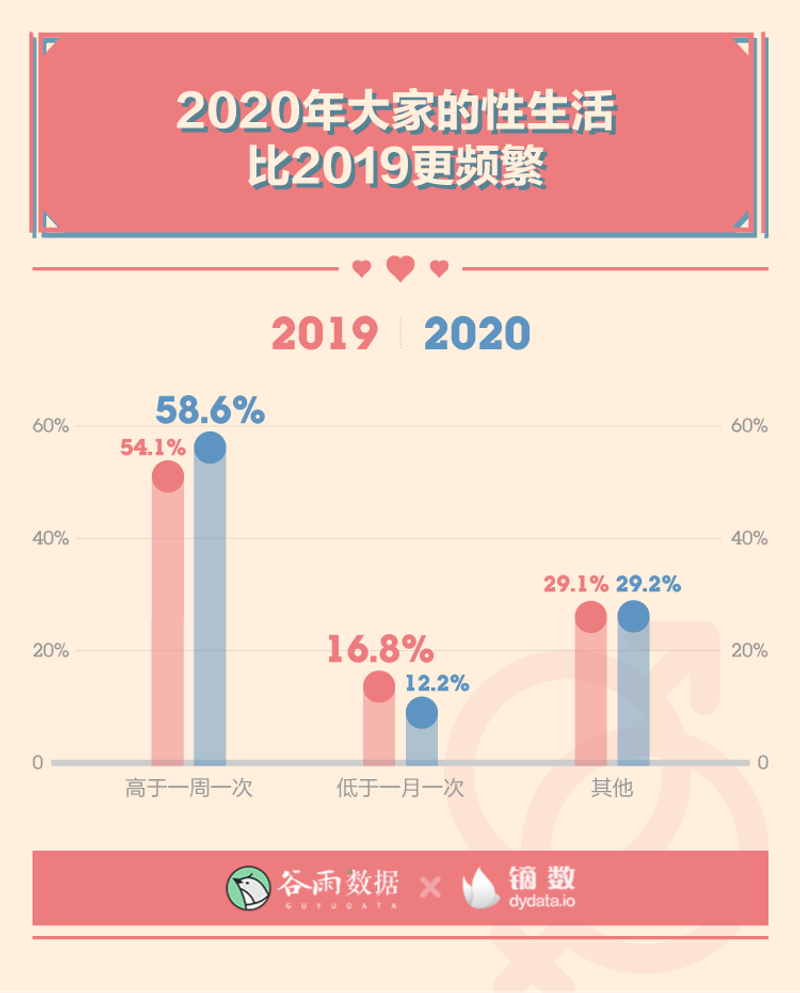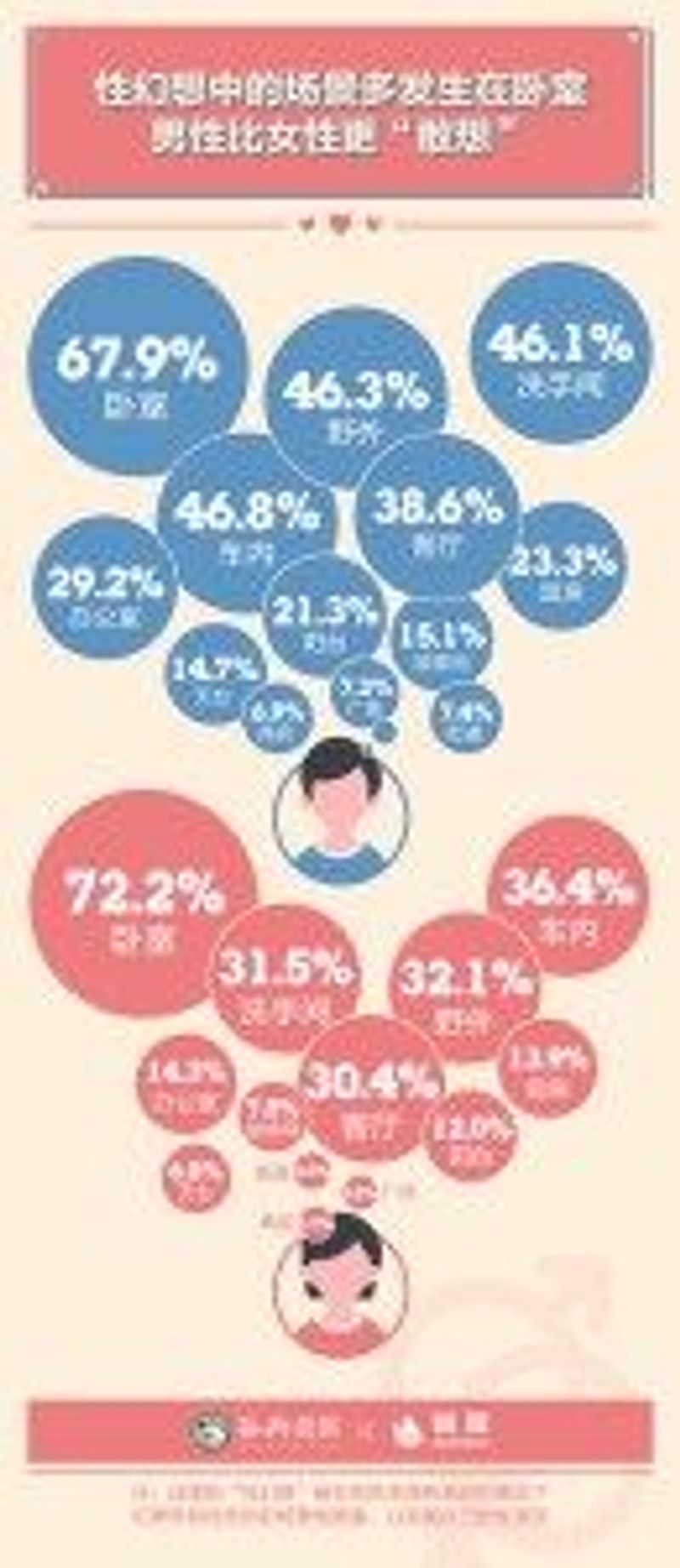type
status
slug
summary
tags
category
icon
password
ID
date
Author
URL
How do Chinese people of different ages express their sexual needs? How do they meet their sexual needs? How do modern Chinese understand the relationship between sex and marriage?
Sex has always been a very awkward topic in the Chinese culutural context. In the several millennia, only very few people dare to talk about sexual issue in public.
With the booming economy and the increasingly open society, the situation is changing. For those so-called “generation Y” in China, their sexual attitudes are very distinct from elder generations, which obviously reflects in their sexual behaviour.
How do Chinese people of different ages express their sexual needs? How do they meet their sexual needs? How do modern Chinese understand the relationship between sex and marriage?
On August 24, China’s Valentine’s Day, GUYU Data, an organization of Tencent News, released the 2020 survey report on “Sex and Love” among Chinese young people.
The report, which collected 31,186 valid samples, reveals the objective situation of Chinese young people when it comes to sexual affairs. This is the second time that the research group released such a report, and the last one was in 2019.
Here, we choose some interesting facts to share with you.

Firstly, as you may expect, the frequency of intercourse of Chinese people in 2020 is higher than that in 2019. This might caused by the quarantine policy due to the epidemic in the first half year, which made couples have more time to stay together.
Compared to 2019, the proportion of those who had sex more than once a week rose 4.5% to 58.6%, and those who had sex once a month fell 4.6%.
However, sex behaviour is becoming more frequent in general, it is still unevenly distributed among different populations. 91.1% of respondents said they would like to have sex more often than once a week, yet only 58.6% were able to achieve that. And 12.2% of respondents had sex less than once a month.
Almost everyone except Chinese born in the 1980s gave themselves a score of about 3.1 out of 5 for the quality of their sex experience. Those who born in 1960 were the most satisfied with their sex lives, scoring 3.2 points, while those who born in 1980 were the least satisfied grooup, scoring 2.97 points.
Interestingly, 79.4% of the respondents thought they could satisfy their partner’s sexual needs, hence only 67.5% of the respondents said that their needs were emt. This showed a general overestimation of sexual abilities and skills among respondents.
It is worth mentioning that the top five most dissatisfied factors with their partners of female respondents were “too little foreplay”, “lack of emotional communication”, “difficulty in achieving orgasm”, “insufficient sexual ability or skills” and “too little time spent having sex”.
According to the results, more than 70% of respondents pay attention to whether their partner is being satisfied. Specifically, men were more concerned than women about how their partner felt during sex, with 23% saying their partner’s quality of sexual life was more important than their own.

sexual fantasy
Consistent with traditional stereotypes, male had more sexual fantasies than women. 46.8 percent of male respondents fantasized about having sex in car, 46.3 percent about having sex outdoors, and 46.1 percent about having sex in the bathroom.
On the contrary, the sexual fantasies of women were about 10 percent less than men in almost all locations, except for the bedroom.
In terms of the object of sexual fantasy, the most common objects for both men and women were their lovers or partners. But men’s secondary targets were of “friends or acquaintances”, accounting for 51.2%. The second most popular sexual fantasy objects among female respondents were the ones who they unrequited crush on.
According to the report, the body parts that most likely to trigger men`s sexual fantasies were the breasts, female sex organs, face, legs and waist. The breasts ranked first with 70.1 percent. The body parts most likely to trigger female exual fantasies were “genitals”, “chest”, “face”, “mouth” and “abdomen”.
There were also big differences between male and female respondents in the relationship between sex and love. 41.8 percent of men believed that sex preceded love, compared with 10.1 percent of women did so.
On the investigation of “the purpose of sex”, the results still indicates that the influence of traditional Chinese culture, yet it indeed has changed greatly.
28.6 percent of male respondents and 20.2 percent female said their main sexual purpose was to “have children.” This is the most traditional idea in China, and even though it’s still a high proportion, it has transformed a lot than it used to be – it only ranked fourth.
The top-ranked reason of list was “deepen emotional communication”, choosing by 80.5 percent of men and 86 percent of women respondents. Meanwhile, 76.4% (men) and 64.4% (women) believed that the main purpose of sex was to satisfy physical desires.
49.2 percent of men and 48.7 percent of women said sex was for “soul bonding,” which was in third place, yet its description was very close to the top-ranked answer. This indicates that most Chinese people believe that the crucial function of sex is to meet psychological needs, which shows that traditional notions of Chinese culture still have strong impact.
[sociallocker id=”5614″]
Among marriage-related questions, the proverb “marriage is the tomb of love” is validated. In most cases, getting married led to less sex, especially for women. 60.1 percent of men and 66.3 percent of women had less sex after getting married.
In addition, “the seven-year itch” was also tested in the survey. According to respondents, sexual satisfaction after marriage bottomed out at 65.7 percent between five and seven years. At the same time, couples in this group had the highest proportion of “routine”. The “routine” here refers to a Chinese term which means compulsory sexual intercourse between couples, which is usually completely unpleasurable, aiming to verify if the husband is cheating.
“Children” was also an important factor affecting the quality of sex life after marriage, with 47.9 percent of married respondents citing children as the reason for reducing their sexual lives. Married respondents with three or more children reported a 7.2% lower level of sexual satisfaction than those without children.
Adults born after 2000 should have been 18, 19 or 20 at the time of the survey, in their final year of high school or their first year of college. This group had significantly higher frequency of sex, with 15 percent having sex every day. Furthermore, they expect to have more lasting sexual experience, with 40.5 percent of respondents in this age group expected sexual intercourse which lasted more than 30 minutes, double the proportion of those born in the 1990s.
They also had more open attitudes for sexual expression than other age groups. 44.1 percent of respondents said that talking about sex is appropriate just after the relationship was established a relationship, yet most other age groups don’t talk about this topic until they had experienced their first sexual intercourse.
In general, it can be found that young people in China are getting rid of existing stereotypes and have more and more open sexual behaviors and expressions. This article only selected some crucial data from the original report. The whole report has three chapters and 29 pages in total. You could click here to download the full version. Unfortunately, the report is published in the image form with simplified Chinese, you will not be able to read it by using automatic translation.
[/sociallocker]
- Author:NotionNext
- URL:https://pandayoo.com/2020/09/08/how-do-young-chinese-experience-the-joy-of-flesh-the-2020-annual-investigation-report-of-sexual-behaviour-in-china
- Copyright:All articles in this blog, except for special statements, adopt BY-NC-SA agreement. Please indicate the source!